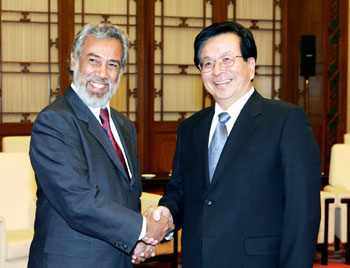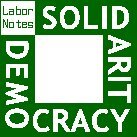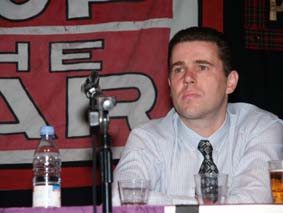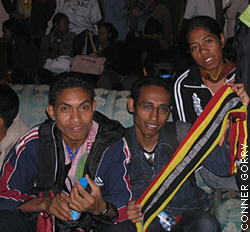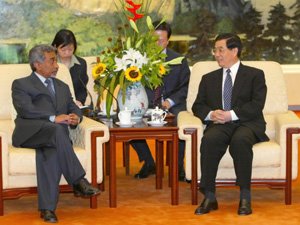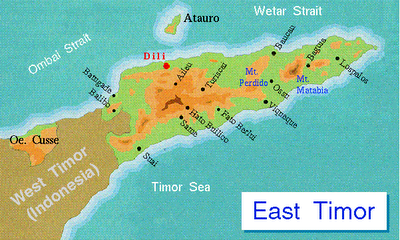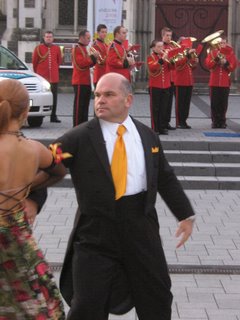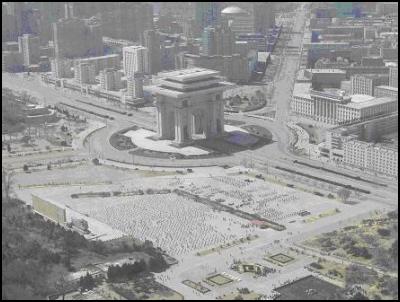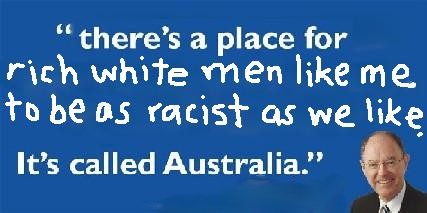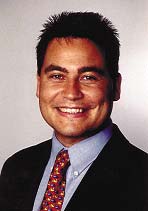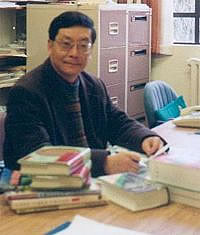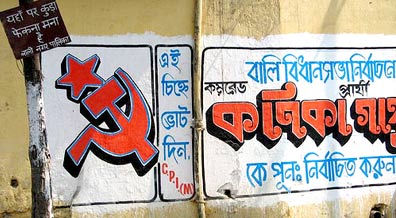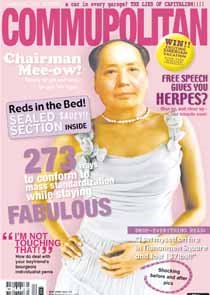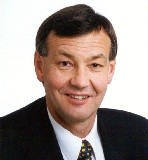Why Are We Helping Xanana Gusmao?

Leftist Blogger Reading the Maps argues that Gusmao is aiming for complete control.
Gusmao's move is an extraordinary one which demands our scrutiny. His post as President of East Timor is largely symbolic, and although the country's constitution calls him 'Supreme Commander of the country's defence force' and gives him the right to declare war he has never before attempted to exercise control over the army, let alone the police. Gusmao's attempt to gain control of these forces can thus been seen as a direct challenge not only to Alkatiri but to the constitution, at least it has been commonly interpreted in East Timor. It might not be going too far to say that, by unilaterally asking East Timor's security forces to disregard Alkatiri's authority and recognise his own, Gusmao is effectively attempting to stage a coup.
Our troops are in Timor Leste to restore order, to re-estlish the government. PM Alkatiri is widely unpopular and has been blamed for the recent police killing of five protestors. He is a Marxist, friendly to China and is presiding over a rapidly expanding Cuban presence in the country.
Gusmao is regarded as a hero of the liberation struggle, who spent many years in Indonesian prison cells. What are his politics? Would he be any better than Altakiri? Should Kiwi troops be risking their lives to keep his government in power?
I quote a little history from the early days of Timor Leste's ruling party, Fretilin.
From a CAVR? report on the history of Fretilin
At a gathering of surviving military commanders and political cadres in March 1981 a new organisational structure for the Resistance began to emerge. The first “Reorganisation of the Nation Conference” after the fall of the zonas libertadas was held in the area of Maubaion Mount Aitana in the sub-district of Lacluta from 1 to 8 March 1981. The conference was organised by the two members of the Fretilin Central Committee still actively engaged in the struggle in the interior, Xanana Gusmão and Mau Hunu Bulerek Karataianu.
The first item on the agenda was the inauguration of nine new members of the Central Committee... Together with the two other Central Committee members,Xanana Gusmão and Mau Hunu Bolerek Karataianu, they became the leaders of the internal struggle.
The members of the Central Committee living abroad retained their positions: Abílio Abrantes Araújo, Mari Alkatiri, Roque Rodrigues, José Luís Guterres, Guilhermina Araújo, José Ramos-Horta and Rogério Lobato. Abílio Araújo was also appointed Secretary General,while Xanana Gusmão was appointed as the National Political Commissar.
At the conference, the members of the Central Committee decided to establish the Fretilin Marxist-Leninist Party, the Revolutionary Council of National Resistance (Concelho Revolucionário de Resistência Nacionaland to form new structures for Falintil.(Fretilin's armed wing) Xanana Gusmão said that what they did was only to “ratify” the decision taken by the “pioneers” at the Laline Conference in 1977 when, following the lead of the Central Committee’s Department of Political Orientation and Ideology, Marxism-Leninism was officially declared the party’s ideology.
Fretilin officially ditched their Maoist version of Marxist-Leninism in 1984, but you would hardly notice. Contacts were kept up with many communist parties, including the Australian Democratic Socialist Party.
One of the DSP's main experts on East Timor is Max Lane. A former member of the Australian Diplomatic Corps in Jakarta, Lane was recalled amid controversy after he translated the works of jailed Marxist poet Pramoedya Ananta Toer. Lane went on to run the DSP front, Action in Solidarity with Indonesia and East Timor (ASIET) and regularly visited both countries. Currently he is on the DSP National Executive and is a research associate at Sydney University.
He has very close ties to the Timorese Socialist Party (PST), which is openly Marxist-Leninist and one of nine parties which nominated Gusmao for the presidency. The PST is widely regarded as a breakaway from Fretilin, but Max Lane has a slightly different view.
From the DSP's quarterly journal Links
The PST traces its origins as a socialist current to 1981, when a small group of youth established OJETIL, Youth Organisation for an Independent East Timor, as a communist youth group. This occurred at the same time that Xanana Gusmao, as president of FRETILIN, led a move to remake FRETILIN as a Marxist-Leninist party.
It wasn't until December 1989 that three of the original OJETIL activists who had taken up studies in Java and Bali established the FECLITIL (Clandestine Student Front for the Liberation of East Timor). In the meantime, OJETIL had become more moderate.
The Timorese Socialist Association (AST), later the PST, was developed during a period when the key directive coming through the CNRM (later renamed CNRT, National Council for Timorese Resistance) was for activists not to develop a party affiliation or identity. In 1998, the PST began operating openly in Indonesia and East Timor. The PST had developed a substantial base in East Timor as well as in Bali, Java, South Sumatra and East Kalimantan. It began the initial work to establish worker, farmer, youth and women's organisations.
An article in the DSP's Green Left Weekly September 12th 2001 demonstrates the close affinity between Gusmao and the PST.
DILI — In its first major mobilisation since the beginning of East Timor's election campaign, on August 25 some 5000 Timorese Socialist Party members and supporters gathered at Dili's Independence Field for one of the most energetic, enthusiastic and political rallies the country has yet seen.
Following opening remarks by the rally coordinator, singers and musicians gave a lively rendition of the party's anthem. The crowd — with raised arms and clenched fists — sang along enthusiastically and ended with calls of ``Viva PST'' and ``Viva Socalisme''. This was followed by music and a performance by traditional East Timorese dancers.
To many people's surprise the first speaker was resistance leader Xanana Gusmao. Although Gusmao has been present at a number of election rallies — usually in his former role as a journalist and photographer — this was the first time he had spoken at a political rally.
Gusmao began by thanking PST general secretary Avelino Coelho da Silva, party president Pedro da Costa, the party's international representative Azancot de Menezes and party spokesperson Nelson Correia, who he referred to as ``respected comrades''.
In his address, Gusmao stated that Marxism was a part of a social and democratic society and indicated his support for the PST as a Marxist-Leninist party. He emphasised the importance of non-violence — a condition upon which he agreed to accept a nomination for the presidency — and said that if socialism can change a society it should be accepted. He closed with the call, ``Viva PST'', to cheers and applause from the crowd.
Coelho later told Green Left Weekly that Gusmao's remarks were especially significant, as they send a clear signal to right-wing forces who are already attempting to whip up anti-socialist and anti-PST sentiment.
Kiwi troops fought bravely in Korea, Malaya and Vietnam to keep Marxist-Leninists out of power. Now we have NZ soldiers in Timor-Leste keeping the peace while two Marxists fight for control of their socialist party (Fretilin), the government of their country and one of the most strategic areas in the Asia Pacific region.
I have the utmost respect for the NZ Armed Forces. I have no respect for a government that would misuse our forces to support the establishment of a Marxist enclave in the centre of a highly unstable region.
